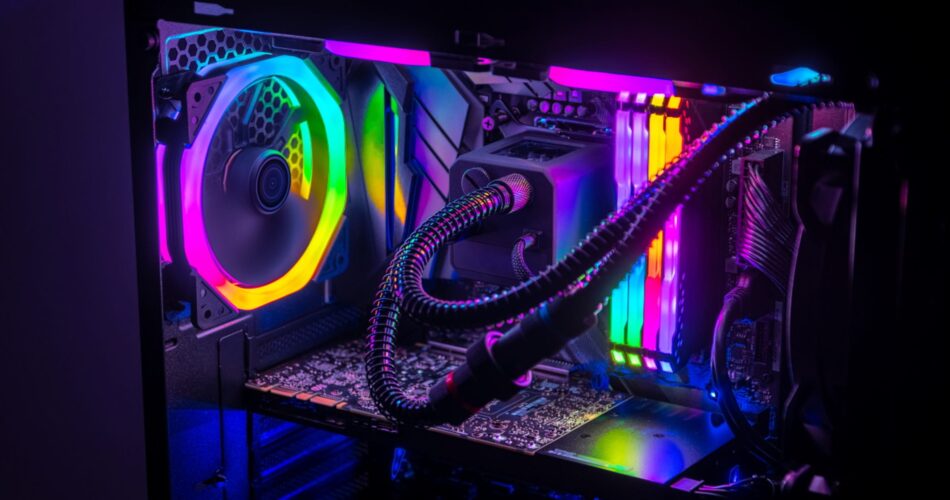
So you want to get a new gaming PC. You finally settled on a budget, and have a list of games in mind that you’d like to play. Now comes the big decision. Do you go the easy way and get a prebuilt gaming PC, or do you build your own PC?
Building a PC can be a fulfilling experience, but some people might be better served by prebuilt PCs. We’ll look at the pros and cons of each option, and which one you should go for.
Advantages of a Prebuilt PC

A prebuilt PC is, essentially, what its name says — it’s a PC that comes pre-assembled from the factory, or is put together by someone else before it reaches your hands. With a prebuilt PC, you just look at the specs and components it comes with, you make one single payment, and the whole PC is shipped to you. From there, you just plug it in, plug in your peripherals, and get playing without any additional setup.
On one hand, it’s by far the safest and most simple option. You get the whole package all at once, and you don’t need to do anything else to it — you take it out of the box, you plug it in, and you get playing. You also don’t need to do any troubleshooting or testing, as the computer has normally already been tested after assembly before it reaches your hands in order to make sure it’s in working condition.
On the other hand, though, a prebuilt PC can be more expensive. It can be assembled by an OEM like ASUS or HP, or it can be put together by third parties who buy off-the-shelf parts and put it together for you. In both cases, they usually need to turn a profit on both the parts themselves and the time it takes them to assemble the PC, which is usually why buying a prebuilt PC can be considerably more expensive.
Reasons to Consider Custom-Built PCs

Then, we have custom-built PCs. You buy different off-the-shelf parts (like a GPU, a CPU, a motherboard, a power supply, and a hard drive) and put everything together to ultimately end up with a working computer.
Buying, and assembling, a PC yourself has a number of advantages. For one, it’s often cheaper this way. You only need to worry about the prices of the parts themselves, and perhaps shipping as well, but since you’re building it yourself, there are really no added costs. Prices of parts can occasionally fluctuate wildly, as shown by GPU shortages where graphics cards can skyrocket in price — in these cases, prebuilt PCs can actually be cheaper since OEMs make parts themselves and third-party builders buy them in bulk. But most of the time, custom-built PCs are cheaper.
Building your own PC can also be a fun, and fulfilling, experience. It’s difficult, and if you’re challenging yourself to do it, you can mess up stuff. But ultimately, if you look up tutorials and be very careful, you can walk out with a PC you built yourself and be proud of it.
But its challenging nature can be a disadvantage by itself too. There are a lot of things that can go wrong, and you need to be properly informed, and quite careful, when doing it. It definitely has a learning curve to it, and while it’s relatively easy to master, newbies can have a hard time.
Which Option Should I Choose?
Especially if you’re a geek, I’d make the argument building your own PC is all-around better. Not only can it be cheaper—though not necessarily, so be sure to shop around—but, for a geek, it’s also a rewarding experience and something you can be proud of once you get through it.
But we also realize that it’s not an experience for everyone. For that reason, there’s no shame in going the prebuilt route. After all, it’s more stress-free and all-around simpler.
If you want to build your own PC, there are many online marketplaces where you can easily have parts ordered and shipped to you. Newegg is perhaps one of the most commonly used ones, but you can also score nice deals on websites like B&H and Amazon. Micro Center is also a good option, but it’s better if you’d rather go to a physical location and pick out parts yourself.
Meanwhile, your choices for prebuilt PCs can vary depending on what you’re looking for exactly. If you want to buy a PC from an OEM like Alienware, Dell, or ASUS, you might want to buy it directly from that specific manufacturer’s website, if at all possible. It’s better because you might get better warranty terms from your manufacturer directly. If not, then third-party retailers like Amazon or Newegg could also be a good choice.
Finally, if you want a PC from a third-party builder, like Origin, iBuyPower, or MainGear, you can order it from the storefront of that specific builder. Often, you’ll even have a part picker in that specific website where you can modify certain specifications, so a preset works better for you. PC builds from these companies can take a few weeks, or even months, to ship, so that’s something you need to take into account when you’re buying your machine.
Source link



